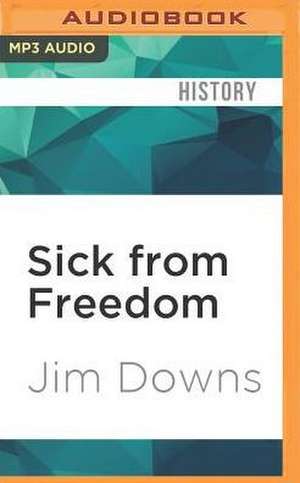Sick from Freedom
Autor Jim Downs Spus de Gabriel Bushen Limba Engleză CD-Audio
Bondspeople who fled from slavery during and after the Civil War did not expect that their flight toward freedom would lead to sickness, disease, suffering, and death. But the war produced the largest biological crisis of the nineteenth century, and as historian Jim Downs reveals in this groundbreaking volume, it had deadly consequences for hundreds of thousands of freed people.
In "Sick from Freedom, " Downs recovers the untold story of one of the bitterest ironies in American history that the emancipation of the slaves, seen as one of the great turning points in U.S. history, had devastating consequences for innumerable freed people. Drawing on massive new research into the records of the Medical Division of the Freedmen's Bureau-a nascent national health system that cared for more than one million freed slaves he shows how the collapse of the plantation economy released a plague of lethal diseases. With emancipation, African Americans seized the chance to move, migrating as never before. But in their journey to freedom, they also encountered yellow fever, smallpox, cholera, dysentery, malnutrition, and exposure. To address this crisis, the Medical Division hired more than 120 physicians, establishing some forty underfinanced and understaffed hospitals scattered throughout the South, largely in response to medical emergencies. Downs shows that the goal of the Medical Division was to promote a healthy workforce, an aim which often excluded a wide range of freed people, including women, the elderly, the physically disabled, and children. Downs concludes by tracing how the Reconstruction policy was then implemented in the American West, where it was disastrously applied to Native Americans.
The widespread medical calamity sparked by emancipation is an overlooked episode of the Civil War and its aftermath, poignantly revealed in "Sick from Freedom.""
| Toate formatele și edițiile | Preț | Express |
|---|---|---|
| Paperback (1) | 175.95 lei 31-37 zile | |
| Oxford University Press – 14 ian 2015 | 175.95 lei 31-37 zile | |
| Hardback (1) | 306.61 lei 31-37 zile | |
| Oxford University Press – 30 mai 2012 | 306.61 lei 31-37 zile |
Preț: 55.43 lei
Nou
10.61€ • 11.06$ • 8.83£
Indisponibil temporar
Specificații
Descriere
Bondspeople who fled from slavery during and after the Civil War did not expect that their flight toward freedom would lead to sickness, disease, suffering, and death. But the war produced the largest biological crisis of the nineteenth century, and as historian Jim Downs reveals in this groundbreaking volume, it had deadly consequences for hundreds of thousands of freed people.In Sick from Freedom, Downs recovers the untold story of one of the bitterest ironies in American history--that the emancipation of the slaves, seen as one of the great turning points in U.S. history, had devastating consequences for innumerable freedpeople. Drawing on massive new research into the records of the Medical Division of the Freedmen's Bureau-a nascent national health system that cared for more than one million freed slaves-he shows how the collapse of the plantation economy released a plague of lethal diseases. With emancipation, African Americans seized the chance to move, migrating as never before. But in their journey to freedom, they also encountered yellow fever, smallpox, cholera, dysentery, malnutrition, and exposure. To address this crisis, the Medical Division hired more than 120 physicians, establishing some forty underfinanced and understaffed hospitals scattered throughout the South, largely in response to medical emergencies. Downs shows that the goal of the Medical Division was to promote a healthy workforce, an aim which often excluded a wide range of freedpeople, including women, the elderly, the physically disabled, and children. Downs concludes by tracing how the Reconstruction policy was then implemented in the American West, where it was disastrously applied to Native Americans. The widespread medical calamity sparked by emancipation is an overlooked episode of the Civil War and its aftermath, poignantly revealed in Sick from Freedom.
Recenzii
One comes away from this book with no doubt that the path out of slavery was a minefield of death and disease that needs its proper acknowledgement in histories of reconstruction.
An important challenge to our understanding of an event that scholars and laypeople alike have preferred to see as an uplifting story of newly liberated people vigorously claiming their long-denied rights.
A major turning point in how we understand the African-American past, the nation's past, and their intertwining.
Based on extensive research, particularly in the Freedman's Bureau's Medical Division records, the book details the enormity of the public health crisis that afflicted freed people during and after the Civil War... This is revisionist history at its finest, and it deserves a wide audience. Highly recommended.
Jim Downs' exceptional research has resulted in a major study... Highly recommended.
Sick from Freedom is a welcome addition to the literature on the history of the Civil War and Reconstruction, medicine, and public health... [T]hought-provoking.
Sick from Freedom is beautifully written... The author dedicates this work to 'all those who were emancipated but never made it to freedom'. He honors their memories in this excellent and haunting book.
As Jim Downs makes clear in this carefully documented work, the Union leadership, domestic and military, was wholly unprepared to deal with the breakdown of the system of slavery that followed the Union army with every foray into southern soil... One comes away from this book with no doubt that the path out of slavery was a minefield of death and disease that needs its proper acknowledgment in histories of reconstruction.
A signal contribution to the vastly understudied question of freedpeople's health and a formidable challenge to the dominant analytical framework that has heretofore framed our understanding both of the transition from slavery to freedom in the American South and the meaning of death and dying in the era of the Civil War. It, quite simply, remaps a field.
A fresh and ambitious account of the Civil War era that not only interrogates the transition from slavery to freedom in new and unsettling ways but also invites us to rethink the geographical dimensions of Reconstruction.
Charts new, darker, and profoundly revealing paths into the history of the American emancipation in the Civil War. In a work of medical, social, labor, and military history all at once, Downs shows that achieving freedom for American slaves was a signal triumph, but only through a horrible passage of disease, suffering and death. A 'new' history of emancipation is emerging, and Downs is one of its most talented and innovative craftsmen.
Jim Downs paints a startling and little known portrait of African American emancipation in which struggles for health and survival must be factored alongside the political and economic history of the period.
Traces a shrouded chapter of American history: the mass death and medical devastation that visited African Americans in the immediate wake of legal emancipation. Downs compellingly reveals how the confluence of racial slander, government indifference, and medical malign neglect proved widely fatal, and in doing so he paints a detailed and disheartening portrait of man's inhumanity to man.
An important contribution to understanding the process of emancipation and the suffering so many freedpeople endured.
Downs insists that understanding the scale of the medical crisis for African Americans during the war is critical to the idea of what freedom felt and looked like for those who were trying to experience it... This book reminds us that this grim portrait must be a part of any discussion of the years that messily separate African American slavery from freedom.
Downs' book places the Civil War in another perspective that helps the reader think critically beyond the Emancipation Proclamation ... I would highly recommend this book.















